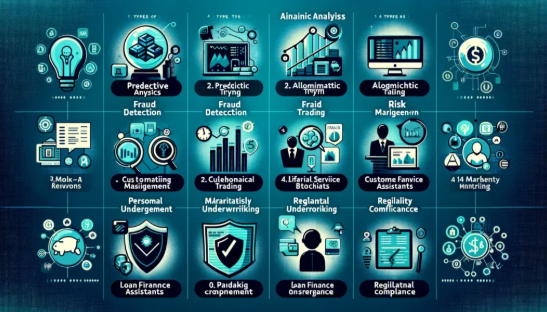Artificial Intelligence (AI) is revolutionizing the finance industry by driving efficiency, improving decision-making, and enhancing customer experiences. As AI technologies continue to evolve, several key trends are shaping the future of finance, transforming how institutions operate and serve their clients.
1. AI-Powered Fraud Detection and Prevention
One of the most critical applications of AI in finance is fraud detection. Machine learning algorithms analyze transaction patterns in real time to identify suspicious activities and prevent fraud. These systems adapt and improve over time, offering more robust protection against increasingly sophisticated cyber threats.
2. Algorithmic Trading and Investment Management
AI is driving innovation in trading by powering algorithmic and high-frequency trading strategies. AI models analyze vast datasets, including market trends, news, and social media sentiment, to make faster and more accurate trading decisions. Robo-advisors are also becoming popular, offering personalized investment advice to retail investors.
3. Enhanced Customer Service with AI Chatbots
Financial institutions are deploying AI-driven chatbots and virtual assistants to provide 24/7 customer support. These AI tools handle routine queries, assist with account management, and guide users through complex financial products, improving customer satisfaction while reducing operational costs.
4. Credit Scoring and Risk Assessment
AI models analyze alternative data sources, such as social media activity and transaction history, to offer more inclusive and accurate credit scoring. This helps financial institutions better assess borrower risk and expand credit access to underserved populations.
5. Regulatory Compliance and Anti-Money Laundering (AML)
AI aids compliance teams by automating the monitoring of transactions and communications to detect regulatory violations and money laundering activities. Natural Language Processing (NLP) helps review large volumes of regulatory documents and communications efficiently.
6. Personalized Financial Products and Services
AI enables financial institutions to tailor products and services based on individual customer behavior and preferences. From customized loan offers to personalized investment portfolios, AI enhances user engagement and loyalty.
7. Predictive Analytics for Financial Planning
Using predictive analytics, AI forecasts market movements, customer churn, and financial risks. This insight supports better strategic planning and proactive decision-making within financial organizations.
8. Blockchain and AI Integration
The convergence of AI and blockchain technology is creating new opportunities for secure, transparent, and automated financial transactions, smart contracts, and fraud prevention.
Conclusion
The integration of AI into finance is driving unprecedented transformation across multiple areas, from fraud detection and customer service to trading and regulatory compliance. Staying ahead of these trends is essential for financial institutions aiming to remain competitive and deliver superior value to their customers.







Leave feedback about this